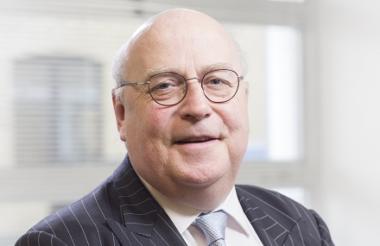Sir Stuart Etherington has criticised the Charity Commission’s intervention during the European Union referendum for discouraging charities from participating in the debate.
He also said the result of the European Union referendum demonstrated that the charity sector had lost touch with some of those it seeks to represent and hadn’t done enough to speak out on key issues in the lead up to the vote last year.
In an wide ranging speech this morning ahead of a panel discusion for charities about Brexit Etherington said that there were a number of lessons for the charity sector and that it was important that organisations were aware of the impact that leaving the EU will have on their staff and beneficiaries.
He called on the sector to look at issues with “fresh eyes” to make sure that the sector made the most of opportunities from Brexit and supporting government with “evidence-based policy proposals”.
‘The regulator has a cross to carry’
Etherington criticised the way the Charity Commission had behaved during the referendum campaign, when it published guidance that many interpreted as discouraging charities from engaging with the campaign before withdrawing and amending it.
He said the original guidance “set completely the wrong tone” and that although it was withdrawn, “the damage had been done” and that “our regulator has a cross to carry”.
This had contributed to the charity sector being too quiet during the referendum campaign. He described an element of “self-policing” taking place because charities are scared of “falling foul of regulators or becoming entangled in ill-tempered debates”.
“This perhaps was most evident in the run up to the referendum. With a few exceptions, charities didn’t enter the referendum debate.”
He added that it was his “deepest regret” that “charities didn’t have the confidence to even inform the debate ahead of polling day”.
“Our democracy works more effectively when charities are involved,” he said “we should not be afraid to engage as we work through the legislative and policy changes of the coming years”.
‘You won’t get into trouble for campaigning’
But he said that charities shouldn’t be discouraged from being vocal about the issues during Brexit negotiations.
In response to a question from the audience, he said the commission had “screwed up” on its referendum guidance, “but more importantly it knows it screwed up”.
He said that in his opinion charities campaigning within the rules “won’t get into too much trouble from regulators” and shouldn’t worry.
He also said that government was “in listening mode”, and keen to hear from charities with answers and that the abolition of the anti-advocacy clause from government grant agreements helped.
In response, Sarah Atkinson, director of policy and communications at the Charity Commission, said: “We published our guidance having being asked by charities to clarify the rules in the run up to the referendum. We were made aware of specific concerns and subsequently made some changes to provide greater clarity on the wording and intent. I explained this in detail in a blog at the time. To be clear, the guidance was never unlawful.
“I think it is more important now to look ahead. Brexit is clearly the biggest issue facing our country and charities will rightly wish to be involved in the process. We, alongside charities, have taken part in roundtable discussions on the key concerns and opportunities for the charity sector, and will continue to monitor developments closely.”
‘We were not close enough to our communities’
He said that “there was a difficult message” for many charities in the aftermath of the vote to leave.
“This message was that we were not sufficiently aware of how some people were feeling: disillusioned, frustrated, even angry with the status quo,” he added.
“How did we lose touch with those away from power, not only geographically but also economically and socially? How did we stop hearing their voice?”
He said the sector should have been more aware of tensions in communities and done more to give people a voice.
“Collectively, we should have been more aware of how people felt,” he said.
“And we should have acted immediately to address the root causes and to help find a solution. We could have provided people with a way to express their fears and frustrations other than voting to leave the EU.”
He called for funders to do more to build capacity.
“Philanthropic funders need to double down on the issue of building communities’ capabilities to speak up and advocate for themselves. And those of us with access to institutions should connect and amplify the voices that arise from those communities which have been least heard.”
Charity sector could lose up to £450m from Brexit
Etherington said that NCVO’s estimates that Brexit will cost the charity sector between £350m and £450m.
“Sadly there were no buses to explain how much the EU co-funds and leverages money for activities from medical research to helping people to become employment ready,” he said.
“It’s true that for many years, a meaningful proportion of our sector’s funding has come from the EU. Our estimates tell us that we will lose between £350m - £450m – and this doesn’t include the match funding that is required.
“But this is not a call to cling on to EU funding: this is a call to focus on future aims and objectives and to ensure that funding is available to meet them.”
He warned that “there will be an inevitable temptation to shift any funds that are repatriated to issues where the political pressure to act is greater”.
“Now is the time for government to step up its support for disadvantaged communities and to learn from the charities and voluntary organisations who delivered EU programmes about what is worth preserving and what is not,” he said.
Etherington didn’t call for a like-for-like replacement of EU funds but to “think anew, to genuinely focus on the local and the social, to move on from the bureaucracy and jargon so characteristic of structural funds, and to think about how government and voluntary organisations can focus on outcomes for communities, not tick boxes for auditors”.
He called for “more efficient, less bureaucratic and more strategic” government funding streams.
He said charities would need to “demonstrate the value of the funding it wants, and it must seek to do so from the government’s perspective”.
He announced that NCVO would develop proposals “on how to create new funding streams that will enable our organisations to address the needs of communities and all of those within them, and thereby contribute to building a stronger, fairer Britain that works for everyone”.
One in 20 charity workers are from the EU
He called on Theresa May, Prime Minister, to address the issue of EU nationals in the UK urgently.
He revealed that 5 per cent of the voluntary sector workforce are non-UK EEA nationals and that “this proportion increasing at a higher rate in recent years than the private or public sectors”, particularly in the social care sector.
“Their right to stay is currently under threat, as is the care of a great many vulnerable people that depend on them. When social care, and public services more broadly, are under pressure, surely now is the time to resolve this uncertainty for a significant number of the people who are making those services run.”
He also said charities should begin thinking about implications for human resources and consider ways to support staff affected.
In Charity Finance
Opportunities
Etherington said that charities have an opportunity to shape the post-Brexit world and must engage with policy makers to make the most of it.
“We can work with government to address the challenges we face as a country,” he said “and make the changes we all want to see.”
He also said that there are opportunities to change laws in positive ways for the charity sector, for example it could convince the government to amend VAT rules that currently costs the sector £1.5bn per year in irrecoverable VAT.
“My message here to voluntary organisations is that we must look at issues with fresh eyes,” he said.
“Rather than simply maintain EU programmes and policies under a different name, we must look to the future and see how change can also be a force for good, an opportunity to inject new thinking and find new answers to old problems.”
Related articles












